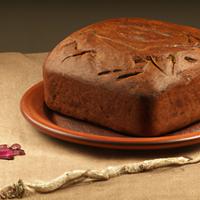
1 serving (80 grams) contains 280 calories, 4.8 grams of protein, 12.0 grams of fat, and 40.0 grams of carbohydrates.

Log this food in SnapCalorie

Nutrition Information
Calories |
823.5 | ||
|---|---|---|---|
% Daily Value* |
|||
| Total Fat | 35.3 g | 45% | |
| Saturated Fat | 11.8 g | 59% | |
| Polyunsaturated Fat | 0 g | ||
| Cholesterol | 117.6 mg | 39% | |
| Sodium | 705.9 mg | 30% | |
| Total Carbohydrates | 117.6 g | 42% | |
| Dietary Fiber | 7.1 g | 25% | |
| Sugars | 70.6 g | ||
| protein | 14.1 g | 28% | |
| Vitamin D | 0 mcg | 0% | |
| Calcium | 47.1 mg | 3% | |
| Iron | 4.7 mg | 26% | |
| Potassium | 352.9 mg | 7% | |
* Percent Daily Values are based on a 2,000 calorie diet. Your daily values may be higher or lower depending on your calorie needs.
Food Attributes
Source of Calories
About Brown flour cake
Brown flour cake is a wholesome dessert made primarily from wholemeal or brown flour, offering a hearty texture and rich flavor. This cake often includes ingredients like eggs, natural sweeteners such as honey or brown sugar, butter, and spices like cinnamon or nutmeg for added warmth. Originating from traditional European baking styles, brown flour cakes are celebrated for their rustic and homely appeal. The use of wholemeal flour retains more fiber, vitamins, and minerals compared to refined white flour, making it a healthier choice for digestion and sustained energy. However, its nutritional value depends on the additional ingredients; versions with reduced sugar and healthier fats, like olive oil, can enhance its health benefits. While it pairs well with toppings like cream or syrup, moderation is key to keeping it a balanced treat.



